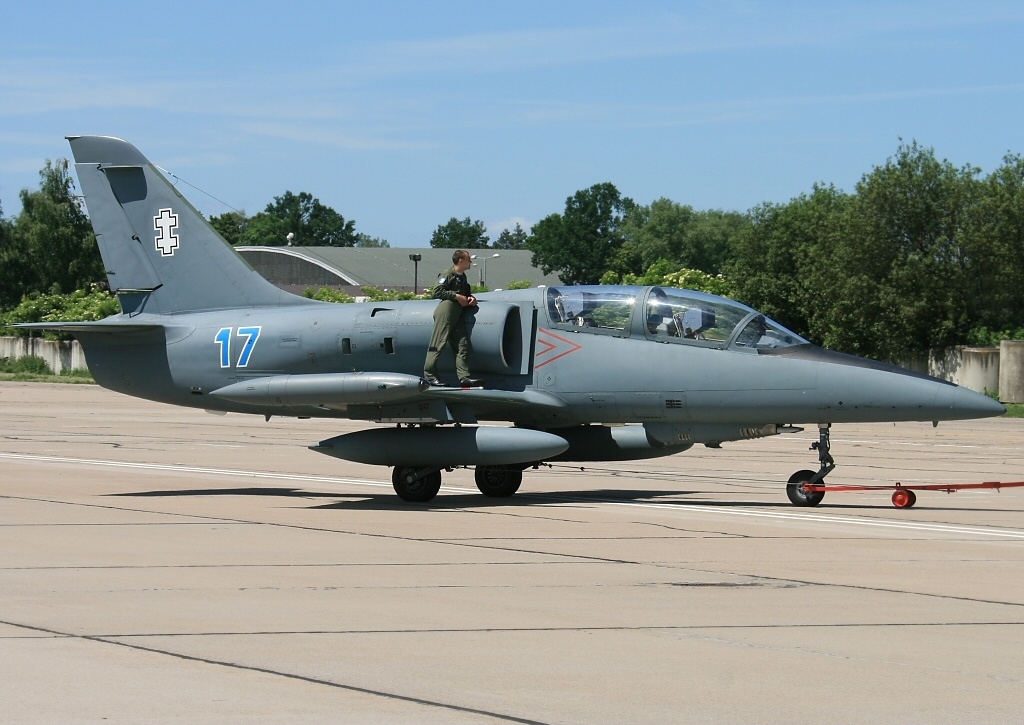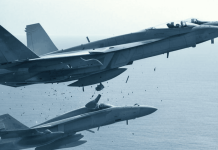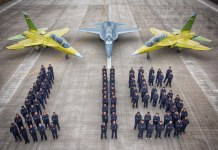Ahead of the much-anticipated delivery of F-16 fighting falcons to Ukraine, Lithuania recently announced the transfer of an Aero Vodochody L-39ZA Albatros light strike jet to Ukraine.
The Lithuanian Ministry of Defence (MoD) announced the delivery of the Aero Vodochody L-39ZA Albatros light strike jet on April 20. The MoD added that the transfer of the light attack aircraft was part of a larger military aid package for Ukraine. Lithuania has been a key military supplier to Kyiv in the ongoing war.
According to reports, the L-39ZA aircraft will be integrated into the Ukrainian Air Force after it has been assembled and tested. The Ukrainian Air Force already has the L-39ZA in its arsenal, which it uses as a light fighter and a ground attack platform.
Ukraine has been an L-39 operator for a long time. It had a fleet of about 30 to 40 of these aircraft before the Russian invasion. However, several were lost in the fighting. So, adding any more jets would provide the small air force with more power against the superior Russian forces.
Used for training in the past, the aircraft has long been retired by the Lithuanian Armed Forces. The variant of the aircraft supplied to Ukraine by Lithuania was developed in the 1970s and has an internal cannon in addition to the ability to store a variety of weapons in its outer pylons.
🇱🇹🇺🇦Today, another shipment of Lithuanian military aid reached Ukraine. We delivered a disassembled light attack aircraft L-39ZA "Albatros" to the Ukrainian Armed Forces. L-39ZA "Albatros" was used in @LTU_Army to train fighter control officers, ensuring pilots' combat readiness. pic.twitter.com/sS3STsu8N2
— Lithuanian MOD 🇱🇹 (@Lithuanian_MoD) April 20, 2024
Some reports in local Ukrainian media noted that the development was especially noteworthy since it was the first time Lithuania had provided aviation equipment to Ukraine since Russia launched the invasion in February 2022.
Additionally, the type of aircraft chosen for transfer has also been flagged as intriguing since it can be effectively deployed to attack Russian positions.
Based on the L-39C, which is also a useful light attack aircraft, the L-39ZA is a training-combat aircraft. It features four hard points where unguided rocket pods or bombs can be connected, and it is built to support a combat load of 1100 kilograms.
The L-39ZA’s armament consists of a double-barreled 23mm GSh-23L aircraft gun, which can hold 150 rounds of ammunition.

According to reports, the L-39ZA is essentially similar to the L-39C Albatros which it is based on.
Before the Russian invasion, Ukraine inherited an array of combat aircraft from the Soviet Union in 1991. These included 34 L-39s, 12 Su-24 “Fencers,” 25 Su-25 “Frogfoots,” 33 Su-27 “Flankers,” and 50 MiG-29 “Fulcrums.” Left with several losses and damaged aircraft, Ukraine has received foreign airframes, parts, and assistance to preserve its fleet.
The Lithuanian Defense Minister Laurynas Kasčiūnas, attending the EU Foreign Affairs Council, said Lithuania “will fill one of the gaps in Ukraine’s air defense.” Lithuania has pledged to provide air surveillance radars to Kyiv. He reiterated that the country was considering contributing radars to the German-led air defense coalition for Ukraine. Additionally, the country is also allocating 3 million euros for the production of FPV drones for the Ukrainian Armed Forces.
The Lithuanian Foreign Minister Gabrielius Landsbergis said that even when the United States approves a package of aid for Ukraine, other Western nations should not give up on providing additional support to Kyiv.
“There can’t be any coming down, no stopping of assistance. We have to continue to speak about how we are going to assist Ukraine further,” Landsbergis said. We dodged a historic bullet. But, unfortunately, many more bullets are on the way. We can be joyous for a day, but we have to be prepared for the battle that comes tomorrow.”
While the Lithuanian Armed Forces have already reinforced the Ukrainian Air Force with their light attack aircraft, the service is also getting ready to welcome the F-16 Fighting Falcons, an aircraft that it has been lobbying for a very long time now.
Danish F-16s To Touch Down Soon
The Danish envoy to Ukraine recently announced that Ukraine would receive F-16 fighter jets from Denmark this summer.
The Danish ambassador said, “Don’t worry. There will definitely be aircraft for Ukraine. This is our entire F-16 fleet, which is now being decommissioned because we are receiving a new generation of F-35s.”
He said that all of Denmark’s F-16s were being retired, with some aircraft heading to Argentina. The Danish Defense Ministry had announced earlier this year that the country intended to donate 19 F-16 fighter aircraft to Ukraine.
Ukraine’s foreign minister, Dmytro Kuleba, stated in January 2024 that everything was on schedule for the delivery of the Danish-promised batch of aircraft. Danish Defense Minister Troels Lund Poulsen later reiterated this the following month, saying Denmark was working “at full capacity” to deliver the first F-16 fighter jets to Ukraine this summer.
However, until now, the delivery schedule of cutting-edge fighter jets has been uncertain.

The addition of Denmark’s F-16s to Ukraine’s expanding fleet of fighter jets, which its major allies have already pledged, could allow Kyiv to potentially use them on the front lines as early as this year. Besides Denmark, the Netherlands and Norway have also promised to deliver their share of F-16s to the Ukrainian Air Force.
The Ukraine Armed Forces will be strengthened with US-made F-16 fighter jets from NATO allies, which can be used to target Russian installations. NATO Secretary General Jens Stoltenberg previously announced that once Ukraine acquired US-made F-16 fighter jets from its allies, the nation would have the authority to deploy these aircraft to target legitimate Russian military targets beyond Ukraine’s borders.
At that time, the NATO Secretary General also emphasized the significance of timely delivery, stressing that well-trained pilots and maintenance crews were crucial to maximize the combat efficacy of the fighters. “So I think we should listen to military experts exactly when we’re ready or when allies are ready to start sending and delivering F-16s. The faster, the better,” Stoltenberg said.
With the recent announcement by the Danish ambassador, there is anticipation that the much-awaited F-16s will finally touch down in Ukraine soon to be deployed against the Russian forces.
- Contact the author at sakshi.tiwari9555 (at) gmail.com
- Follow EurAsian Times on Google News




